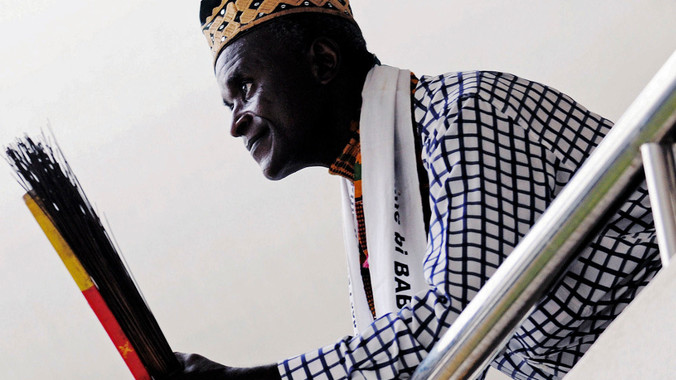Offline, off road and off the power grid, the forest village of Ndjock-Nkong in Cameroon is not an obvious choice for an online venture seeking to emulate the giant online encyclopedia Wikipedia.
It is, however, a perfect place for an online African “ark” that will collect and preserve the continent’s endangered languages and traditions, says a local man with a mission.
Gaston Donnat Bappa embodies the combination of old and new: he inherited the title of clan chief from his great-grandfather, grandfather and father but has 34 years of experience in computer technology. He hopes to bring the two worlds together in the user-generated African Traditions Online Encyclopedia (Atoe).

“People think traditions don’t belong with information and communications technology (ICT) because traditions are so far behind us and ICT is so far ahead of us,” Bappa said. “But if you don’t know who you are, you don’t know where you are going.”
Bappa (56) is creating a site that he hopes will become the first port of call for African arts and crafts, food, laws, medicine, music, oral storytelling, religion, science, sport – anything that can be defined as tradition, dating back millions of years. A prototype is open for contributions, with early entries including Myths and Legends of the Bantu, and Concepts of Social Justice in Traditional Africa .
The idea grew from Bappa’s passion for beliefs and customs from a young age in his village, Ndjock-Nkong, where he has been chief for 22 years, as well as his travels to more than 20 African countries as a senior IT engineer and consultant and bank executive. Most urgently, he found in the web a chance to rescue a precious legacy on the verge of extinction.
“I saw that even in my tribe traditions are beginning to disappear. When I was going to other countries in Africa I saw it was the same. It’s not because young people don’t want to learn about them but because they don’t have the access in urban areas.”
Languages are a prime example, said Bappa, president of an association of 42 traditional chiefs. “Every week we lose a language in the world. Africa has more languages than any other continent – more than 2 000 – and every one has 30 to 50 tribes. If you lose the language it’s very difficult to know the traditions of your area.”
But the Atoe will guard against forgetting, he hopes. “ICT is the only way to store traditions for the next generations. Between now and 2100 there will be 4 billion people in Africa; if we don’t know our traditions, we won’t be able to manage our economic development. They can also be available to the African diaspora in America, Europe or anywhere in the world.”
The success of Wikipedia, whose English edition has more than 4.5-million articles, is a natural model. Similarly, the Atoe will use wiki applications for volunteers to input, change or remove content in collaboration with others. Noting that there are already more than 1 000 websites on African traditions, Bappa is adamant that content will be referenced and verified for accuracy.
“The Wikipedia format remains the best international standard for online encyclopedias: the entire software is free of charge and provides the best and easiest technology. But we will improve the format of content, by integrating more multimedia. For example, we will illustrate African traditional medicine with pictures.”
But unlike Wikipedia, born in 2001 and hosted by the Wikimedia Foundation in the tech hub of San Francisco, the Atoe’s headquarters will be starting from scratch. Ndjock-Nkong is 93 miles from Cameroon’s capital, Yaoundé, and 19 miles from the main road in thick forest, Bappa says. “To get there you need a very strong car.” There is no access to a phone network, the internet or the electricity grid for the dwindling population of fewer than 300. “Even radio reception is very difficult.”
Yet Bappa has a vision. He hopes to fit solar panels to generate power and install servers that will eventually host the Atoe. “Little by little, the government is starting to repair the road. In less than three years, we’ll have TV and radio. We will bring satellite internet to the village so it is connected to the entire world. When we have our own servers, we’ll transfer all the data.”
Until then, Bappa is operating from Yaoundé and working to raise worldwide awareness of the project, which he will formally unveil at next year’s eLearning Africa conference. He plans to approach Microsoft and other potential sponsors in an attempt to raise €400 000 (£323 000) for the initial phase. He also hopes to incorporate content from Wikipedia.
“It is not only for Africa,” he said. “It will be open to all worldwide, Africans and non-Africans. It is for the whole of humankind because Africa is the cradle of humanity.”
